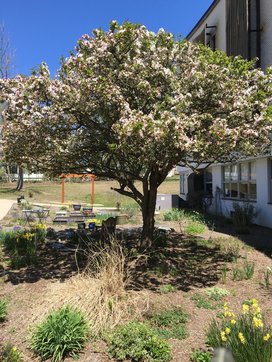 Rabbi Yohanan Ben Zakai said: "If you have a sapling in your hand and are told that the Messiah has arrived, plant the sapling and then go to greet him." Avot of Rabbi Natan B, chapter 31 In this month falls the minor holiday of Tu BiShvat (the 15th of Sh'vat), the “New Year for Trees,” in which Jewish tradition asks us to pay special attention to trees and ecological concerns both in Israel and the wider world. Many people now consider it to be the Jewish equivalent of Arbor Day, a day on which to celebrate nature and reconnect with the earth. In Israel it has become the national tree planting holiday, part of the decades-long effort to create productive land from desert and swamp. Many communities, including Temple Sinai, conduct a Tu BiShvat Seder, which is said to have been created by Rabbi Isaac Luria of S'fat. Modeled after the Passover Seder, the ritual gives special meaning to the fruits and trees of Israel. We enjoy eating fruits and nuts that grow in Israel, such as olives, dates, figs, apricots, almonds and walnuts, and we drink four cups of wine with appropriate blessings. In the Biblical Garden, the fig tree, now wrapped under burlap for the winter, the grapevine and the almond tree now wait in anticipation of spring. The dwarf olive and pomegranate trees are in residence on a kitchen counter for the winter. And in the sixth grade Religious School classroom, a planter sits in a sunny window with over a dozen soil-filled paper cups. Emerging from the soil are little etrog (citron) trees planted two months ago, the yield of an etrog that was used in our Sukkot festival celebration last fall. Some will soon go home with students, and a couple will become Biblical Garden specimens, the “fruit of goodly trees” referenced in Leviticus 23:40. It’s a simple activity, to cut open a fruit, enjoy the marvelous citrus scent, pick out seeds from the pulp, plant and water them. As students cultivate seeds in the classroom and soon in the garden, they may also cultivate within themselves a more intimate connection with nature, and discover that their actions can make a difference: they can fully participate in the work of tikkun olam – repair of the world. This year, the Tu BiShvat Seder at Temple Sinai will be held on Friday evening, February 10, at 7:00 PM following the 6:00 PM Shabbat evening service. Enjoy a blog post by Rabbi Jeff Goldwasser on Tu BiShvat at this link. Comments are closed.
|
AuthorsMichael Schlesinger is Temple Sinai’s Biblical Gardener. Mike has been gardening since he was eight years old. He used to grow grape vines and make wine when he lived in California. He now tends to our garden, continuing the traditions started by Catherine Walters. Archives
March 2020
|

Affiliated with the Union for Reform Judaism
30 Hagen Avenue • Cranston, RI 02920 • 401-942-8350 Office: dottie@templesinairi.org Rabbi Jeffrey Goldwasser: [email protected] |
Want to sign up for the weekly Sinai Scroll email?
Click here to receive weekly updates on Temple services, events and a message from the Rabbi. |


